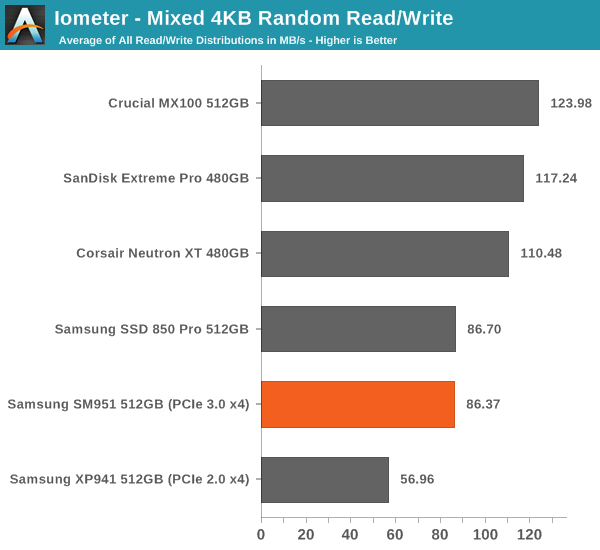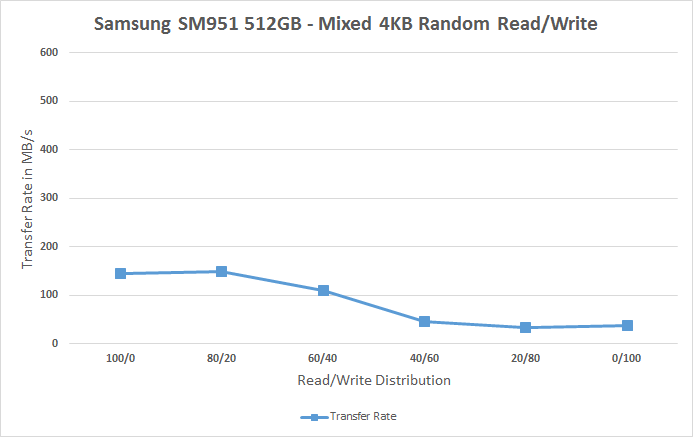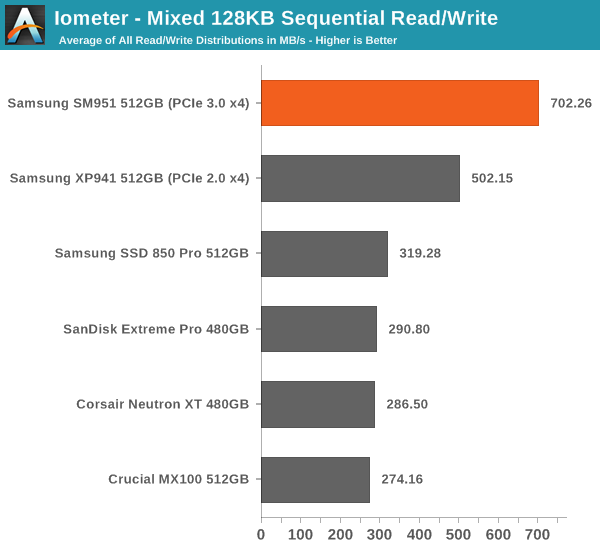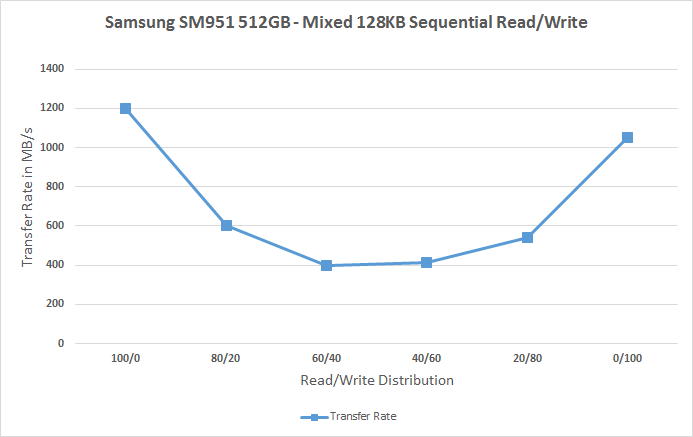Samsung SM951 (512GB) PCIe SSD Review
by Kristian Vättö on February 24, 2015 8:00 AM ESTMixed Random Read/Write Performance
Mixed read/write tests are also a new addition to our test suite. In real world applications a significant portion of workloads are mixed, meaning that there are both read and write IOs. Our Storage Bench benchmarks already illustrate mixed workloads by being based on actual real world IO traces, but until now we haven't had a proper synthetic way to measure mixed performance.
The benchmark is divided into two tests. The first one tests mixed performance with 4KB random IOs at six different read/write distributions starting at 100% reads and adding 20% of writes in each phase. Because we are dealing with a mixed workload that contains reads, the drive is first filled with 128KB sequential data to ensure valid results. Similarly, because the IO pattern is random, I've limited the LBA span to 16GB to ensure that the results aren't affected by IO consistency. The queue depth of the 4KB random test is three.
Again, for the sake of readability, I provide both an average based bar graph as well as a line graph with the full data on it. The bar graph represents an average of all six read/write distribution data rates for quick comparison, whereas the line graph includes a separate data point for each tested distribution.

Quite surprisingly the SM951 and Samsung drives in general don't do very well with mixed data.
 |
|||||||||
The reason lies in the fact that the performance of Samsung drives plummets when the share of writes is increased. At 80/20 read/write, the Samsung drives manage to do pretty well, but after that the performance declines to about 40MB/s. What's odd is that the performance is also bad with 100% writes, whereas with other drives we usually see a spike here. I'm guessing there's some garbage collection going on here that causes the performance degradation.
Mixed Sequential Read/Write Performance
The sequential mixed workload tests are also tested with a full drive, but I've not limited the LBA range as that's not needed with sequential data patterns. The queue depth for the tests is one.

With 128KB sequential data, however, the SM951 is the king of the hill. There's a clear difference between PCIe and SATA based drives, although it's worthy to note that the difference is mostly due to PCIe drives having much higher throughput at 100% reads and writes (i.e. the infamous bathtub curve).
 |
|||||||||










128 Comments
View All Comments
peevee - Friday, March 20, 2015 - link
IOmeter? Packing several weeks/months of IO into a several minutes/hours test? Seriously, your tests have become SO artificial as not to correspond to any real life experiences at all. For example, in real life SSD write speed almost does not matter, because almost always they are asynchronous - write happens into cache and user does not wait anything, or speed of writes is limited by the speed of data acquisition - case in point, you download test is always limited by much slower internet speed, or copying pictures off camera/SD card are limited by much slower camera/reader, USB or SD speeds etc. Background backup, happening without a user AT ALL? Come on!It would be actually much more interesting to see at least a few REAL numbers, like good old starting Windows or copying a catalog full of pictures and videos or starting a VM. So the users would see what amount of their time they would REALLY save by investing extra into a faster drive.
kishisaki - Tuesday, April 7, 2015 - link
How did you get all those speed with Asus Z97 Deluxe?I thought it only has a 10Gb/s M.2 Slot?
Gradius2 - Wednesday, April 15, 2015 - link
My solution is WAYYYY cheaper and bigger, I have 670GB (real size) on my little RAID, see the performance: http://i61.tinypic.com/2vt9mo6.jpgxyvyx2 - Wednesday, July 22, 2015 - link
I was able to keep the temps down on my SM951 by attaching a small heatsink... I need to do some data logging, but I don't think it's gone over 60C since:http://s76.photobucket.com/user/xyvyx/media/Comput...">[IMG]http://i76.photobucket.com/albums/j9/xyvyx/Compute...[/IMG]
stevae - Wednesday, August 12, 2015 - link
why isn't there a trouble shoot included IF your result comes back that the drive DOES NOT have trim working? this is incomplete article.Invisibleman - Sunday, August 16, 2015 - link
Kristian,Because I didn't read this review earlier and I am now planning to upgrade my PC to an M2 SSD. I came to this review.
But there is one thing I realy don't understand. As the setup is saying, you have tested with de Asus Z97 DeLuxe. I know there are 2 different versions of this one. 1 is with USB 3.1 support (new version) and 1 with USB 3.0 (Old one) this one I have.
But if I look at the specs then the Z97 DeLuxe shares the bandwide with SataExpress 1 and have only 2 x PCI Express 3.0/2.0 x 16 Slots (Single at 16x or dual at x8/x8 Mode)
But as I read the SM951 needs to have PCI 3.0 x 4bus. Am I missing something? For me it seems that the SM951 can't run full speed on this board. If it goes thru Sata Express then also get only PCI 3.0 X 2. But in the test (charts) you are mention PCI 3.0 x 4. How is this possible to get if the Max is PCI 3.0 x 2?
So can you tell me what I am missing? What do I need to do/buy extra to get this one run one full power meaning PCI 3.0 x 4.
Regards,
Hans
Hoogmade - Monday, December 7, 2015 - link
What card is used to use the SM951 in a Mac Pro 2012?I tried the Addonics ADM2PX4 but that doesn't seem to work.
dtscaps - Friday, March 11, 2016 - link
Ok, this is supposed to be a review to guide me what SSD to buy. I read 10 pages of performance specs and 72 more comments dealing with microseconds marginality. The fact that this drive does or does not have an AES self encrypting mechanism adering to OPAL 2 with a possible IEEE1667 extension IS IMPORTANT. IT IS A COMPLETE SHOW STOPPER if the drive cannot encrypt data. Maybe except if you are a kid playing with new toys.So, is this SSD self encrypting ?
Does it support Opal 2
Does it support the IEEE1667 extension?